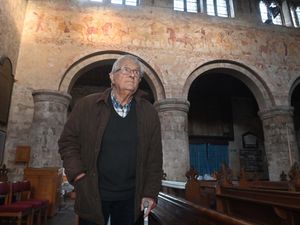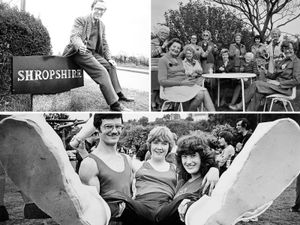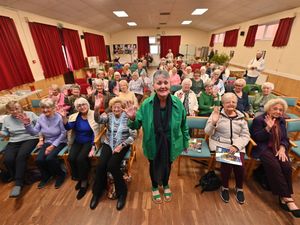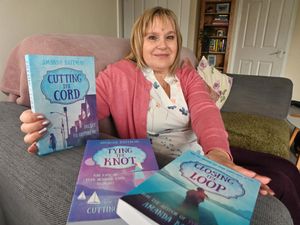Seeing positivity in menopause
It's an entirely natural part of every woman's life but it's one that's often surrounded by silence.
Menopause is rarely a topic of open conversation, especially in the workplace, and for some women this means it can become a time of anxiety and distress.
Sarah Cale believes it's time to start talking about this biological transition, which marks the end of a woman’s menstrual cycle and fertility.
She realised how little support and education women receive about menopause when she began experiencing it herself aged 43.
It led her to create an online community - Positive Menopause - where members could share their stories and offer support to others so they knew they weren't alone.
"I started a small group in Aldridge six years ago on the back of my own bad experience with menopause.
"I didn't get the care I needed from my local GP. I had do my own research. I was working in the construction industry which is very much a masculine world, although that's changing now, so I didn't have to talk to about this. I thought if I'm struggling what can I do that's positive?
"I started this small group on Facebook so women could talk about what they were going through.
"We now have now got more than 600 members," explain Sarah.
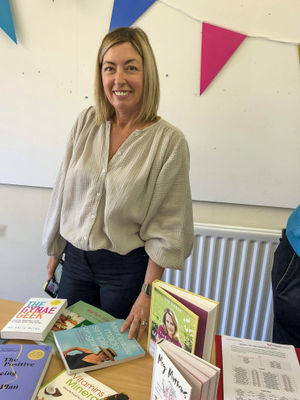
"I wanted to build a community of real women who can support one another.Women supporting women makes all the difference to the season of menopause."
Approximately 13 million women in the UK are either peri or post-menopausal.
Symptoms. which can include hot flashes, chills, night sweats, sleep problems, mood changes, can last for up to 15 years.
Generally they start when a woman is in her 40s, but some women notice changes as early as their mid-30s.
Some of the symptoms can be quite severe and have a significant impact on everyday activities.
Sarah is keen to raise awareness of the issues that can arise during the period to encourage better understanding as she believes many women have no knowledge of what to expect, if their symptoms are normal or where they can go for help and guidance.
Also, she believes it's a period in life that should be positive and runs a website that provides health and wellness advice for menopausal women and also incorporates a friendship forum.
"During the first lockdown I built a website that would give information that wasn't all about hormones. I wanted to be a bit fun as well as informative.
"If somebody is pregnant, everybody is excited and it's visual because they have a bump. When you get to the menopause, no one talks about it and women can suffer in silence.
"It's important to understand the symptoms and how we can support each other because it's an important period in your life. It's another season and it can be both exciting and fabulous. The kids have left home and you have a bit more financial freedom. Women at 50 are not the same as they were 20 or 30 years ago," says Sarah.
Her own experience made her determined to support both women in the community and in the workplace. As well as speaking to community groups, she also works with companies and managers to increase menopause awareness within their business and ensure staff have the support they need.
Sarah believes there are many ways that employers can show care and compassion. "Employers can have an open door policy so women can go in and speak about how they feel. Some women have been to speak to their HR department and had the door shut in their face.
"Small changes make a massive difference to menopause symptoms. Having fans on desks or moving desks nearer windows can help with hot flushes. Giving women space to take a 10-15 minute break when they need it," she tells Weekend.
Offering flexitime can also make women feel more comfortable especially if they are experiencing insomnia or night sweats. "Telling them that it's ok if they come in a bit late for work means work becomes a place of safety."
Sarah is affiliated with the Wellbeing of Women charity and has been involved in Zoom meetings with its Royal Patron, Her Royal Highness the Countess of Wessex.
During one event, they discussed the importance of ensuring “hidden” women’s health issues such as period problems and the menopause are brought "out into the open” and that talking about them is normalised.
"Having worked alongside so many women, both online and in other communities and workplaces, I know first-hand how difficult the season of menopause can be; therefore, raising awareness is imperative to ensure that change takes place for women," says Sarah.
She recently hosted a Galentine's event in collaboration with Tina Portman from House of Treatments at Bosque in Aldridge.
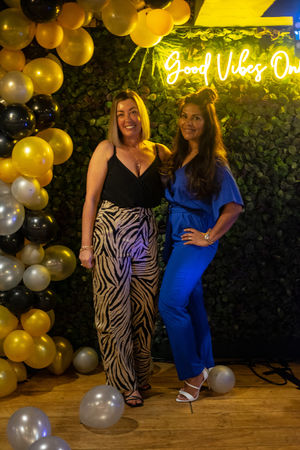
Attended by 60 women, Sarah says the event, held to "celebrate being a woman" was a huge success.
"I have a passion to help women. I talk quite openly about it because if one person starts talking about, it makes talking about it normal. This is a normal thing that all women have to face."
For more information see www.positive-menopause.com

